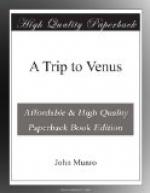“It is a cluster of stars—a spawn of worlds, if I may use the expression,” answered Gazen.
“And what are they made of? I know very little of astronomy.”
“The same stuff as the earth—the same stuff as ourselves—hydrogen, iron, carbon, and other chemical elements. Just as all the books in the world are composed of the same letters, so all the celestial bodies are built of the same elements. Everything is everywhere—”
Gazen was evidently in his own element, and began a long lecture on the constitution of the universe, which appeared to interest Miss Carmichael very much. Somehow it jarred upon me, and I retired to the little smoking-room, where I lit a cigar, and sat down beside the open scuttles to enjoy a quiet smoke.
“Why am I displeased with the lucubrations of the professor?” I said to myself. “Am I jealous of him because he has monopolised the attention of Miss Carmichael? No, I think not. I confess to a certain interest in Miss Carmichael. I believe she is a noble girl, intelligent and affectionate, simple and true; with a touch of poetry in her nature which I had never suspected. She will make an excellent companion to the fortunate man who wins her. When I remember the hard life she has led so far, I confess I cannot help sympathising with her; but surely I am not in love?”
I regret to say that my friend the astronomer, with all his good qualities, was not quite free from the arrogance which leads some men of science to assume a proprietary right in the objects of their discovery. To hear him speak you would think he had created the stars, instead of explaining a secret of their constitution. However, I was used to that little failing in his manner. It was not that. No, it was chiefly the matter of his discourse which had been distasteful to me. The sight of that glorious firmament had filled me with a sentiment of awe and reverence to which his dry and brutal facts were a kind of desecration. Why should our sentiment so often shrink from knowledge? Are we afraid its purity may be contaminated and defiled? Why should science be so inimical to poetry? Is it because the reality is never equal to our dreams? There is more in this antipathy than the fear of disillusion and alloyment. Some of it arises from a difference in the attitude of the mind.
To the poet, nature is a living mystery. He does not seek to know what it is, or how it works. He allows it as a whole to impress itself on his entire soul, like the reflection in a mirror, and is content with the illusion, the effect. By its power and beauty it awakens ideas and sentiments within him. He does not even consider the part which his own mind plays, and as his fancy is quite free, he tends to personify inanimate things, as the ancients did the sun and moon.
To the man of science, on the other hand, nature is a molecular mechanism. He wishes to understand its construction, and mode of action. He enquires into its particular parts with his intellect, and tries to penetrate the illusion in order to lay bare its cause. Heedless of its power and beauty, he remains uninfluenced by sentiment, and mistrusting the part played by his own mind, he tends to destroy the habit of personification.




